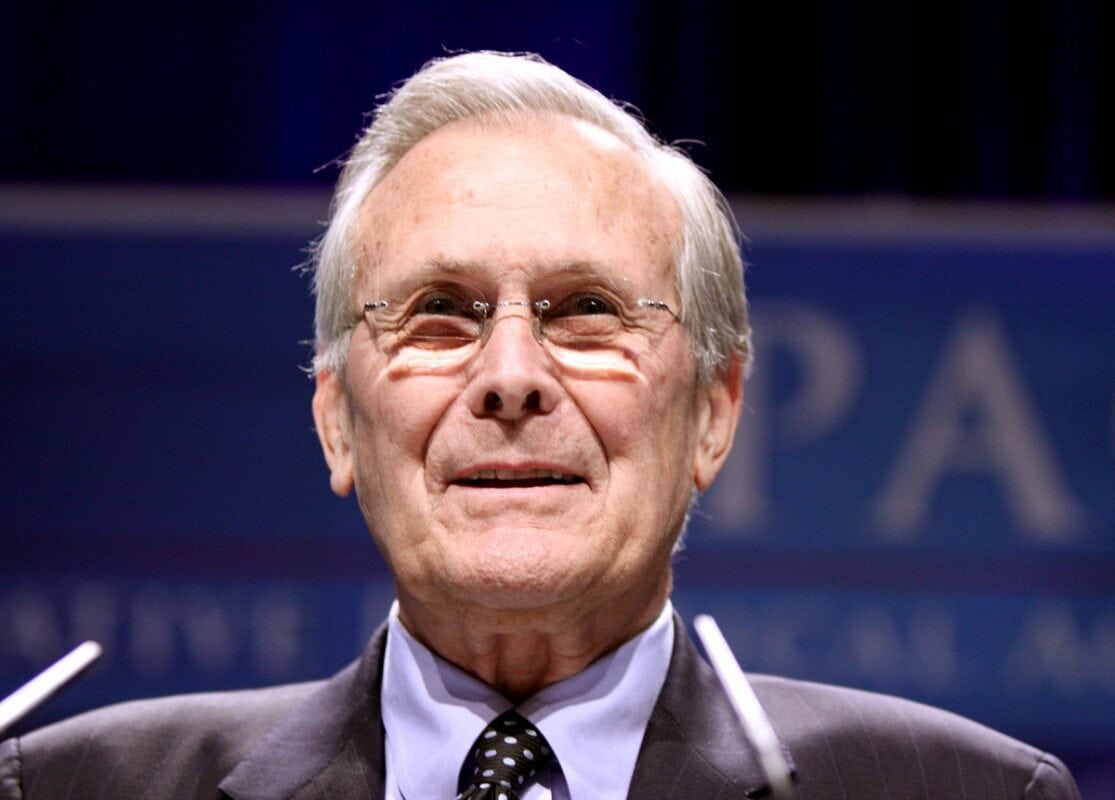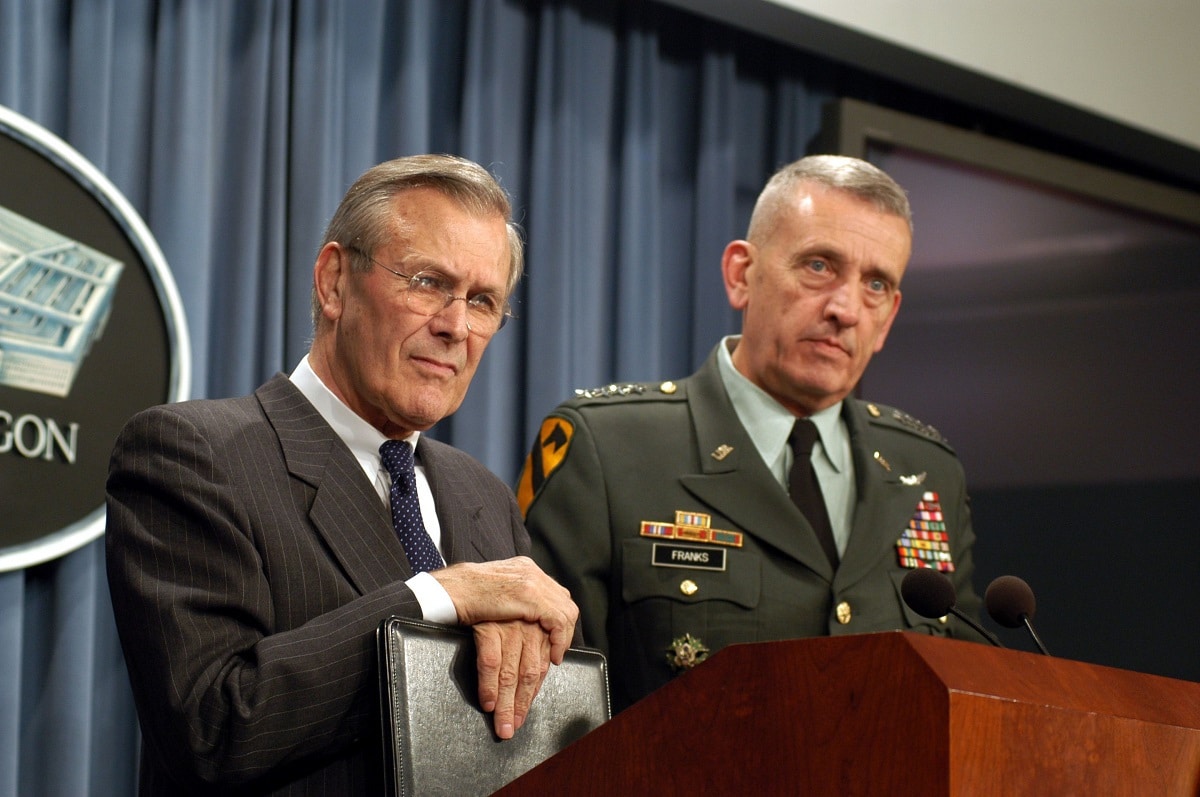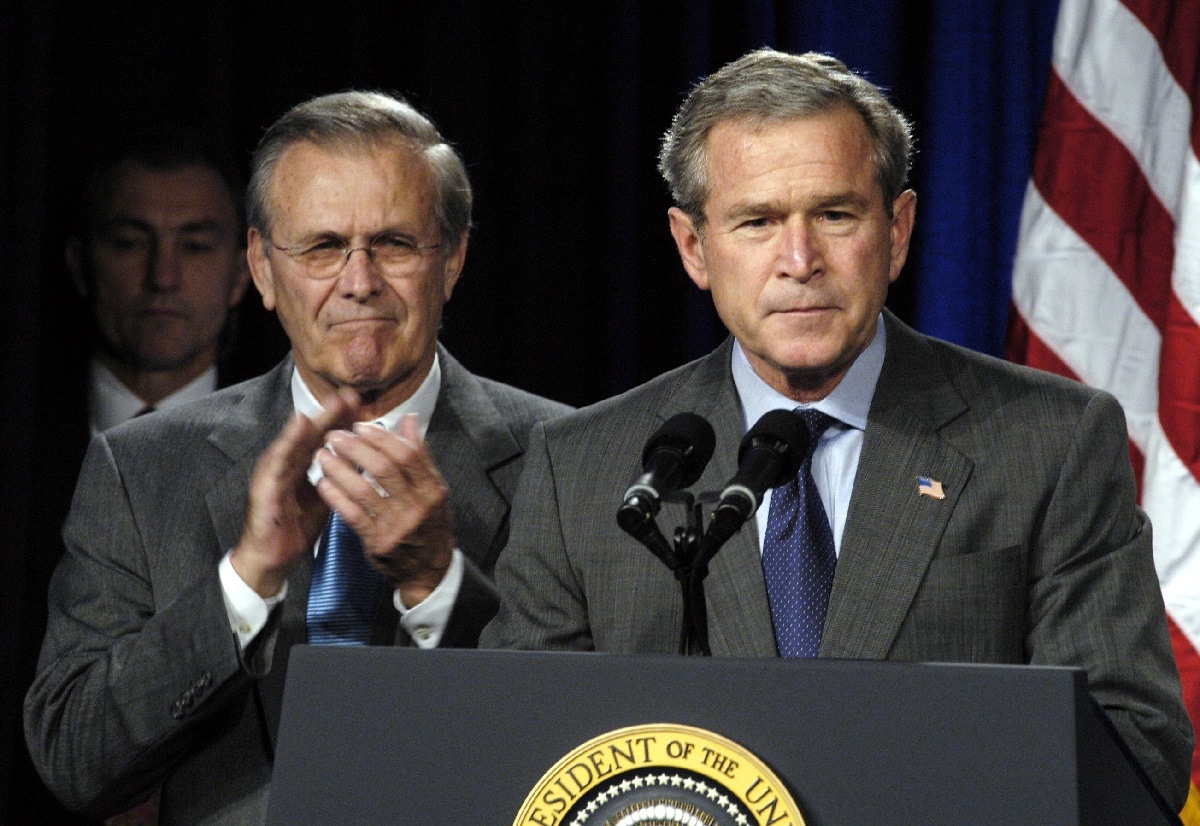Twenty years ago a triumphant superpower—variously termed the unipower, hyperpower, essential nation, and more—was brought low. Having spent years imposing its will upon other nations, bombing, invading, and occupying them essentially at will, the denizens of Washington learned that America’s homeland was vulnerable.
Indeed, that day more than any other demonstrated that the misnamed Department of Defense actually did little to protect the U.S. The job of the Pentagon, once more accurately named the Department of War, was to dominate the world. If the task was obliterating another nation, DOD was up to the task. Keeping Americans safe, not so much.
That day also should have been the moment that the country realized the radical disconnect between what Americans thought of America and what people around the world thought of America. Even as many still see the U.S. as a land of opportunity and hope, others see it as the source of oppression and violence. Indeed, many distinguish between America and its people, liberties, and bounty, and its government.
Yet the U.S. never has been good at introspection. Perhaps that shouldn’t be expected by friendly, earnest, hard-working patriots with little interest in international affairs. Far more culpable, however, are the elites who made Washington foreign policy.
For all the boilerplate rhetoric about freedom, democracy, and human rights, America’s foreign policy leadership agreed with President George H.W. Bush, who famously declared, “what we say goes.” The problem was not that the U.S. sometimes confronted great evil, such as Iraq’s Saddam Hussein, in the context of which Bush was speaking. But America was so often intimately involved in embracing, sometimes even supporting, that evil.
For instance, the U.S. backed Hussein in his war of aggression against Iran in which a million or more people may have died. One aspect of Washington’s support was protecting Gulf oil shipments used to fund his war, which led to the American shootdown of an Iranian airliner, killing 290 innocent people. Tehran was a constant U.S. target because of the revolution against the tyrannical Shah Reza Pahlavi, an American ally who seized power in a coup backed by Washington. In the Middle East, the U.S. backed dictatorships ranging from Egypt to Saudi Arabia.
An equally fundamental failing that distorts American foreign policy is hubris. The capital’s foreign policy elite, whose members seamlessly move in and out of government, Wall Street firms, think tanks, universities, consultancies, and more, almost universally believe that it has been anointed by providence if not God to rule. And that what is now colloquially known as the Blob is unreservedly good for humankind.
However, until the ascension of Madeleine Albright, few masters of the foreign policy universe mentioned such controversial truths in public. In 1998 Albright, then secretary of state, declared: “we are the indispensable nation. We stand tall and we see further than other countries into the future, and we see the danger here to all of us.” The only proper response today to such claims after decades of disastrous military interventions is hysterical laughter.
This sense of superiority probably explained her most infamous remark, made when she was UN ambassador. Asked to justify sanctions against Iraq which, it was estimated, had killed a half million babies, she answered: “we think the price is worth it.” Quite simply, the U.S. was empowered to sentence other peoples to die. And Americans too, as indicated when she earlier asked Colin Powell: “What’s the use of having this superb military you’re always talking about if we can’t use it?”
Although all these characteristics were present during the Cold War, the Soviet collapse removed any substantial foreign constraint on U.S. action. Washington policymakers enjoyed their vastly increased opportunities to do good and ill. Alas, few others benefited. Lord Acton’s pithy aphorism, that “power tends to corrupt, and absolute power corrupts absolutely,” applies to America no less than other nations. The better intentions of Washington officials did not sufficiently mitigate the impact of human sin and arrogance.
The 9/11 atrocity only reinforced U.S. hubris with sanctimony. Not only was the attack morally monstrous. It came as an unimaginable shock. For those who believed not only that Washington could but should run the world, blame surely belonged on everyone else. Indeed, to the Blob the only logical explanation was that America was attacked because it was beautiful, wonderful, free—the exceptional nation, like no other.
After the murder of nearly 3,000 people President Bush told Americans that “Freedom itself was attacked this morning by a faceless coward, and freedom will be defended.” Moreover, he insisted, “America was targeted for attack because we’re the brightest beacon for freedom and opportunity in the world. And no one will keep that light from shining.”
Yet these claims were false in almost every way. The terrorists were not faceless, but quickly were identified. And they were not physical cowards, having sacrificed their lives committing a morally terrible act.
More important, the destruction of the Twin Towers and especially the attempt to wreck the Pentagon were acts of war by people who lacked aircraft carriers, special operations forces, air wings, missiles, and drones. Far from being unique, America joined a long list of targets of terrorists with a variety of political ends. Russia, India, Sri Lanka, Israel, China, Italy, Germany, United Kingdom, Spain, Algeria, Pakistan, Indonesia, Japan, and Greece all have been attacked for a variety of reasons, except for being free societies.
As for al-Qaeda, it did not attack European nations with similar freedoms as America. Indeed, Osama bin Laden dismissed Bush’s claim, asking: “Why don’t we attack Sweden?” The target was not Americans’ exercise of their First or Fourth Amendment rights, but Washington’s persistent assault on other peoples in other countries.
Bin Laden’s 2004 video was explicit: “it entered my mind that we should punish the oppressor in kind—and that we should destroy the towers in America in order that they taste some of what we tasted, and so that they be deterred from killing our women and children.” James Bamford, who covered intelligence issues, reported that bin Laden and Ayman al-Zawahiri, who succeeded bin Laden, “believed that the United States and Israel had been waging war against Muslims for decades.”
The misdeeds of U.S. policy did not make bin Laden or al-Zawahiri any less evil and certainly did not justify attacks on innocents. However, understanding why terrorism occurs is essential in attempting to reduce if not prevent future attacks. Unfortunately, the grievances were, and still are, many. People fill the jails in lands whose oppressive governments are backed by Uncle Sam. People’s lands are occupied by aggressive governments supported by Uncle Sam. People in foreign lands are routinely killed by Uncle Sam’s drones. Other people sometimes find their lands bombed, invaded, and occupied by Uncle Sam. American attempts to justify these acts often are disingenuous at best and pathetic at worst. Blowback is natural, even inevitable. Indeed, Americans would not likely stand by passively if these acts were committed on the U.S. by a foreign power.
This reality was well understood, even if routinely ignored. The Defense Science Board Summer Task Force on DoD Responses to Transnational Threats reported in 1997: “America’s position in the world invites attack simply because of its presence. Historical data show a strong correlation between U.S. involvement in international situations and an increase in terrorist attacks against the United States.”
Robert A. Pape of the University of Chicago conducted detailed research demonstrating how terrorism is used to confront foreign occupation. CIA counter-terrorism analyst Michael Scheuer, author of Imperial Hubris: Why the West is Losing the War on Terror, pointed to U.S. support for multiple authoritarian Arab governments, economic sanctions and military strikes against Iraq, support for Israel’s occupation of Palestinian lands, and American forces based in Saudi Arabia.
Although most politicians refuse to acknowledge reality, a few have broken the code of silence. For instance, Bush’s Deputy Defense Secretary Paul Wolfowitz noted after the Iraq invasion: The presence of America’s military in Saudi Arabia has “been a huge recruiting device for al-Qaeda. In fact, if you look at bin Laden, one of his principal grievances was the presence of so-called crusader forces in the Holy Land.” Even clearer are the 1983 Lebanese bombings of the U.S. embassy and Marines Corps barracks, which responded to American involvement in active combat supporting one faction in the multi-sided civil war.
Yet U.S. policy proceeds as if no one has learned anything. The Iraq war became another terrorist cause celeb. Daniel Benjamin of Brookings concluded that the resulting imbroglio “gave the jihadists an unmistakable boost. Terrorism is about advancing a narrative and persuading a targeted audience to believe it. Although leading figures in the American administration have often spoken of the terrorists’ ideology of hatred, U.S. actions have too often lent inadvertent confirmation to the terrorists’ narrative.” Yet American forces remain in Iraq, with little purpose other than to engage in perpetual war against militias backed by Iran, which are determined to exact revenge for the Trump administration’s assassination not only of Tehran’s Qassem Soleimani but also the Iraqi head of Iraq’s Popular Mobilization Forces, Abu Mahdi al-Mohandis.
Americans saw a similar reaction play out in the case of the would-be Times Square bomber. The colloquy involving Faisal Shahzad, a naturalized citizen from Pakistan, was instructive: “Shahzad said the judge needed to understand his role. ‘I consider myself to be a Muslim soldier,’ he said. When [Judge Miriam] Cedarbaum asked whether he considered the people in Times Square to be innocent, he said they had elected the U.S. government. ‘Even children?’ said Cedarbaum. ‘When the drones [in Pakistan] hit, they don’t see children,’ answered Shahzad. He then said, ‘I am part of the answer to the U.S. killing the Muslim people’.”
Yet history continues to repeat. The much-reported drone strike in Kabul, supposedly to prevent another suicide attack, killed ten family members, including seven children. And the target likely was not a terrorist. Reported the New York Times: an “investigation of video evidence, along with interviews with more than a dozen of the driver’s co-workers and family members in Kabul, raises doubts about the U.S. version of events, including whether explosives were present in the vehicle, whether the driver had a connection to ISIS, and whether there was a second explosion after the missile struck the car.” A surviving family member, bereaved friend, or angry bystander might become the newest recruit to al-Qaeda, ISIS-K, or another terrorist group.
No surprise, then, there are more terrorist-wannabes today than on September 10, 2010. Although America has avoided a mass casualty event in the U.S., which thankfully are difficult to execute, by the numbers the U.S. has lost ground on terrorism.
Detailed Daniel DePetris of Defense Priorities: “There are now four times the number of State Department-designated Salafi-jihadist terrorist groups today than there were before 9/11. In 2002, the State Department recorded 199 international terrorist incidents around the world; in 2019, the most recent State Department terrorism report publicly available, that number jumped to an average of 692 per month. The Center for Strategic and International Studies counted a range of 100,000 to 230,000 Salafi-jihadist fighters in 2018, among the highest in four decades. There are more terrorist groups operating in more countries, across more continents, today than there were before the war on terrorism began.”
The attacks of 9/11 were a great tragedy, starting with the victims of the attacks that day. Also tragic were those killed in America’s endless wars, including hundreds of thousands of foreign civilians. Alas, the tragedy will continue into the future, consuming the victims of future attacks, especially those resulting from the failure of American policymakers to learn anything from the experience of the 20 years. More terrorists will continue to be created as America continues to make enemies.

Image: Creative Commons.

Secretary of Defense Donald H. Rumsfeld (left) and the Commander of U.S. Central Command General Tommy Franks, listen to a question at the close of a Pentagon press conference on March 5, 2003. Rumsfeld and Franks gave reporters an operational update and fielded questions on the possible conflict in Iraq.
Terrorism is evil and must be confronted. However, that requires understanding why terrorists attack. Until Washington adopts a more responsible and restrained foreign policy, terrorism will remain a deadly threat. Americans should ask if the price of trying to run the globe is too high. The time to answer and respond is now, before the next bloody attack.
Doug Bandow is a Senior Fellow at the Cato Institute. A former Special Assistant to President Ronald Reagan, he is author of Foreign Follies: America’s New Global Empire. Bandow is also a Contributing Editor for 1945.

